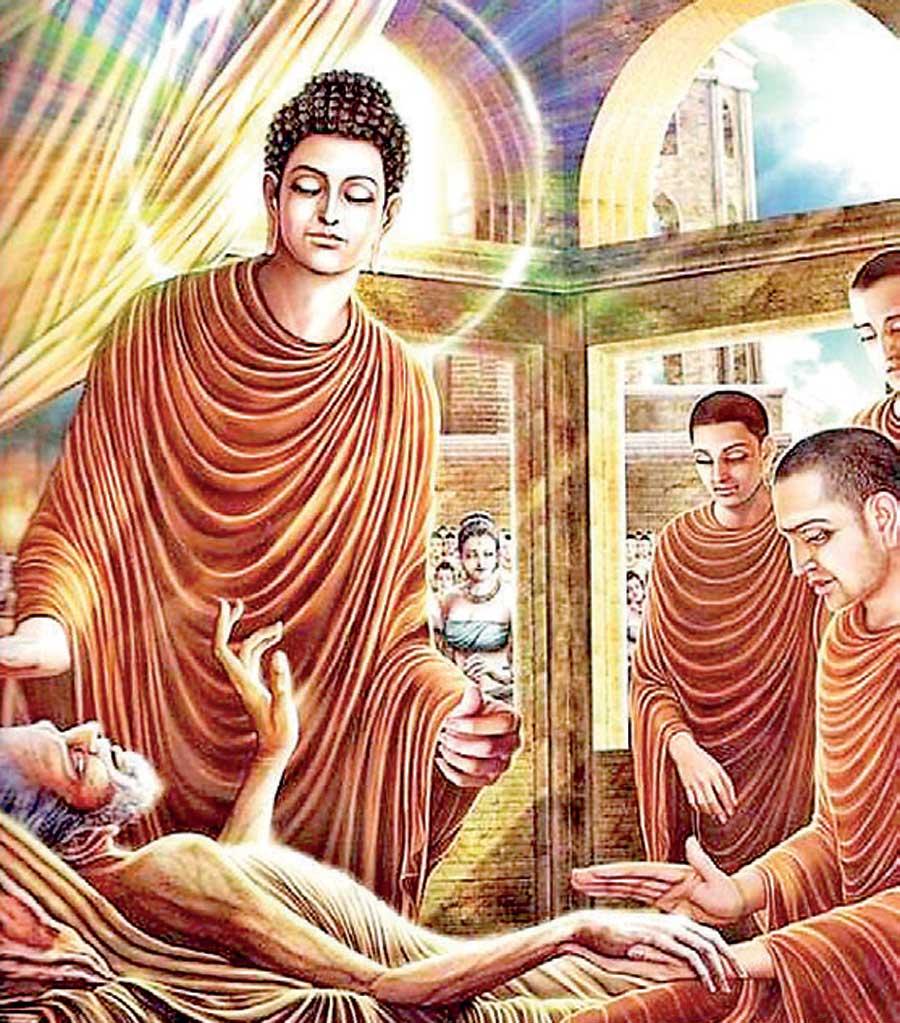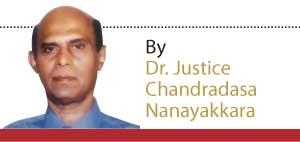Reply To:
Name - Reply Comment
Last Updated : 2024-04-24 22:26:00
- Lord Buddha placed a great emphasis on the contemplation of death as awareness of death makes us perceive the futility of worldly concerns and pleasures
- Even with the most brilliant application of modern science and technology, man has not yet seen the possibility of outlawing the ephemeral nature of human life and his ultimate enemy; death
Death and dying is a subject that has evoked such deep and disturbing emotion that people generally tend to live in denial of death. People’s thoughts and feelings are so programmed from their childhood, that they generally avoid discussing the subject of death considering it depressing and morbid. Yet fact remains we die sooner or later. That is the uncomfortable truth. The time of death is uncertain and unpredictable, but the truth of death is not. All mortals who are born one day will perish and die. Some die in their prime, others in their old age but all must inevitably die. Uninvited we came into this world unbidden we leave it.
in denial of death. People’s thoughts and feelings are so programmed from their childhood, that they generally avoid discussing the subject of death considering it depressing and morbid. Yet fact remains we die sooner or later. That is the uncomfortable truth. The time of death is uncertain and unpredictable, but the truth of death is not. All mortals who are born one day will perish and die. Some die in their prime, others in their old age but all must inevitably die. Uninvited we came into this world unbidden we leave it.
Therefore, immortality is something that we can never achieve, but some refuse to accept this fact deluding themselves that death is a far-away phenomenon not something to be worried about now. In this connection, Buddhist teachings have enduring relevance to the present context as the ravaging Covid-19 pandemic has brought about immense suffering, despair and death to tens of millions of people around the world.
The subject of death is closely bound up with the Buddhist concept of impermanence, another fundamental teaching of Buddhism, which brings us face to face with our own mortality. We have ample evidence of death all around us. Deaths are occurring everywhere and at all times. Even the cells of our bodies are constantly dying every second and replaced by new cells. All of us are inexorably moving towards physical death every moment.
It is said about 200,000 people die on average everyday in the world, and nearly about 70 million people die every year globally. According to primary estimates by the end of 2020, the total number of global death attributable to the Covid pandemic is in the region 3 million.
Therefore, it is clear that today people are living in uncertain times and no one knows exactly what will happen to us and our loved ones, as the pandemic we are going through is unprecedented and unpredictable. The way things are turning out, we may not live through the day.
 Our body has been continually changing right from the day we were born, through our childhood and youth until we reach our destined end - death. It should be understood that even the Lord Buddha himself with his great store of the accumulated virtues could not avoid physical death.
Our body has been continually changing right from the day we were born, through our childhood and youth until we reach our destined end - death. It should be understood that even the Lord Buddha himself with his great store of the accumulated virtues could not avoid physical death.
Death can strike us at any moment. It was clearly illustrated by the Buddha when he said “Death will take away a man though he is attached to his children and his possessions, just as a great flood takes away a sleeping village.” According to Buddhism this is not the first and last life we have in this world.
"It is attachment to life on earth which creates the unnatural fear of death. It creates strong anxiety on the person who lives in fear worrying that some illness or accident might snuff out the precious little life he cherishes"
Universality of death and suffering is amply exemplified by two popular stories in Buddhism. During Buddha’s time, there lived a woman named Kissagothami. After her marriage, she gave birth to a son. One day, the son fell sick and died soon after. Kissagothami loved her son very much, and refused to believe that her son was dead. She carried the body of her son around the village seeking help to bring back her son to life. But when she realized that no one could help her she sought the advice of Lord Buddha who then asked her to bring him a handful of mustard seed from a house where no death had taken place. Following the Buddha’s advice, she desperately went from house to house looking for some mustard seed from where no death had taken place. And when she failed in her attempt, the realization dawned on her that no house was free from mortality and everyone was subject to death.
The other story which clearly illustrates the universality of death is that of Patachara who lived in Buddha’s time. Her story was really pathetic. She was a woman who lost her two children, husband, brother, parents and all her possessions after marriage. Losing her senses, she ran naked and wild in the streets until she met the Buddha. The Buddha brought her back to sanity by explaining that death is to be expected as a natural phenomenon in all living beings.
It is clear from these stories that death is an integral part of life. One has to meet ones destined end one day.
The concept of impermanence and death (Annitya) propounded by the Lord Buddha brings to light the three characteristics (tilaakkana) of our existence in this world, namely impermanence (annicca), suffering or unsatisfactoriness (dukka) and non self insubstantiality or (annitta), which constitute the core teaching of the Buddha.
Lord Buddha encouraged his followers to contemplate on the fragility of life and to reflect on it regularly. Whoever constantly bears in mind the fact that he would some day be subject to death would be eager to fulfil is duties to his fellow human beings. Contemplating on death brings to the surface the dreadful truth that everything we have acquired and earned and accomplished, all our precious relationships, and our loved ones inevitably succumb to time and deteriorate and cease to exist.
Reflecting on death should not make us depressed or morbid, it only helps us to free ourselves from fear of death. Moreover, reflection on death will change the way we live and our attitude towards life.
It is attachment to life on earth which creates the unnatural fear of death. It creates strong anxiety on the person who lives in fear worrying that some illness or accident might snuff out the precious little life he cherishes.
Although Buddhism emphasizes the universality of suffering and death, it cannot be characterised as a pessimistic religion. It is neither totally pessimistic nor totally optimistic but realistic as it not only emphasises the truth of suffering but also suggests a means to end of the suffering and gain eternal happiness. Lord Buddha placed a great emphasis on the contemplation of death as awareness of death makes us perceive the futility of worldly concerns and pleasures.
Man has achieved great marvellous things throughout the centuries, his ingenuity and strength have enabled him to conquer space and subdue matter to his will. Yet for all his capabilities and ingenuity, he still remains fragile and vulnerable. Even with the most brilliant application of modern science and technology, man has not yet seen the possibility of outlawing the ephemeral nature of human life and his ultimate enemy; death.
Material possessions, friends, relations, worldly acclaim and power all vanish at the time of death leaving nothing behind. None of these will be carried over to the next life. The kith and kin, friends and relatives accompany the dead body to the grave, not further. As one’s future birth will be determined by one’s own actions (Karma) either wholesome or unwholesome committed in the present birth. Karmic reactions arising from past and present evil deeds may linger with us on our rebirth.
Death for a Buddhist should be a smooth and peaceful process. The person who is dying should be in a virtuous state of mind in the moments before death, so that a good rebirth may result. It is said that the final moments of life are the springboard into the next life.
During our existence on earth, we all like to be healthy and be blessed with happiness. But our wishes can never be guaranteed. We are plagued by sickness, pain and discomfort. Therefore immortality is something that can never be achieved.
Bhikkhu Bodhi in his book “Buddha’s Words” succinctly states thus “Just as a dew drop on the tip of a blade of grass will quickly vanish at sunrise and will not last long; even so is human like a dew drop. It is short, limited, and brief; it is full of suffering, full of tribulation..... none who is born can escape death”.
We should constantly remind ourselves of the Buddha’s advice.
athiest Saturday, 25 September 2021 11:12 AM
we athiests do not have any Problem with death.ash or dust thats all.

Add comment
Comments will be edited (grammar, spelling and slang) and authorized at the discretion of Daily Mirror online. The website also has the right not to publish selected comments.
Reply To:
Name - Reply Comment
US authorities are currently reviewing the manifest of every cargo aboard MV
On March 26, a couple arriving from Thailand was arrested with 88 live animal
According to villagers from Naula-Moragolla out of 105 families 80 can afford
Is the situation in Sri Lanka so grim that locals harbour hope that they coul